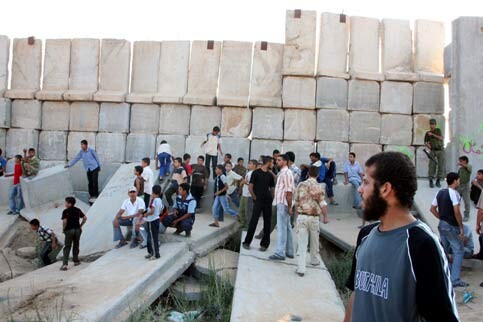Palestinian Center for Human Rights 3 August 2006

Palestinian supporters of Islamic Jihad try to enter Rafah Crossing in an attempt to free the Palestinians stuck on the Egyptian side of the border of the Gaza Strip, 16 July 2006. (MaanImages/Hatem Omar)
PCHR is dismayed by the role of the European Union Monitors at the Rafah Crossing, which contributes in imposing collective punishment of the civilian population. The Centre calls upon these monitors to respect the rights of the Gaza Strip population to travel through the Rafah Crossing. The Centre calls upon the monitors to return immediately to the Crossing to reopen it for travel.
PCHR is dismayed by the position of the European Union (EU) monitors at Rafah International Crossing Point (Rafah Crossing) on the border between the Gaza Strip and Egypt. This position falls in line with the Israeli position of imposing collective punishment on the civilian of the Gaza Strip by preventing travel in and out of the Strip. The Centre is worried that their role could lead to an escalation of violations of the rights of Palestinian civilians, especially their right to movement and travel in and out of the Gaza Strip. The Centre calls upon the monitors to immediately return to the Rafah Crossing, and to work towards reopening the crossing for Palestinians wanting to travel out of the Strip and for the thousands of Gaza Strip residents who want to return home. PCHR calls upon the EU to refrain from being a party to any actions that are forms of reprisals or collective punishment against the civilian population. These actions are serious violations of International Humanitarian Law, especially the Fourth Geneva Convention.
It is noted that the borders agreement between the Palestinian National Authority and Israel, reached on 15 November 2005 with American mediation, stated that the Palestinian side and EU monitors are responsible for opening and operating the Rafah Crossing starting on 25 November 2005. Live camera feeds are transmitted from all Rafah Crossing rooms to a control room in the Karm Abu Salem crossing. A Palestinian security officer and an Israeli security officer watch the camera feeds. At the time, PCHR expressed concern that the borders agreement will lead to the continuation of Israeli control over the movement of Palestinians in and out of the Gaza Strip. On 25 November 2005, EU monitors started to fulfill their mission in operating the Rafah Crossing with the Palestinian side. The operation of the crossing was conducted without significant problems. However, the monitors withdrew from the Rafah Crossing or did not arrive on several occasions due to tips by Israel that there are security warnings of potential threat to the monitors. However, these alerts were proven to be false; and monitors resumed their work without being subjected to any form of threat.
PCHR’s documentation indicates that the Rafah Crossing has been closed since 25 June 2006 after the military operation conducted by Palestinian resistance factions near the Egyptian-Israeli border, southeast of Rafah. The operation resulted in the death of 2 Israeli soldiers, capturing a third soldier, and the death of 2 Palestinian activists. The closure of Rafah Crossing has resulted in a catastrophic humanitarian situation for thousands of Palestinians stuck on the Egyptian side of the border and for hundreds of travelers stuck in the Egyptian side of the Rafah Crossing. Five patients, 2 women and 3 children, died due to deterioration of their health conditions and the inability to return to the Gaza Strip, and the inability to refer them for treatment abroad.
It is noted that nearly 7,000 Palestinian travelers are forced to stay in Egypt, including 400 in the exit terminal at the Egyptian side of the Rafah Crossing. Five hundred Palestinians returned to the Gaza Strip in exceptional circumstances when the border fence was breached on 14 July 2006. And nearly 6,000 travelers returned to the Strip on 18 July 2006 when Israel allowed the temporary opening of the Rafah Crossing for returnees only.
Thousands of Palestinians are suffering due to the closure of the Rafah Crossing. Nearly 15,000 Palestinians are waiting for the reopening of the Crossing, including hundreds of families that live abroad and are in the Strip for family visits. The face the threat of losing their residency visas in the countries where they work and live. In addition, hundreds of patients are awaiting the reopening of the Rafah Crossing in order to travel for treatment in Egyptian hospitals for ailments and conditions that cannot be treated in the Gaza Strip. Hundreds of students are waiting for the reopening of the Rafah Crossing in order to resume their studies abroad. And hundreds of recent secondary school graduates who want to pursue university studies abroad are also waiting for the reopening of the Rafah Crossing. The work of governmental and civil society organizations was affected by the closure, especially the areas that require external travel and coordination.
Thousands of Gaza Strip residents who traveled abroad before the closure are forced to wait for the opening of the closure in other countries, especially Egypt.
PCHR condemns the position of EU monitors in the Rafah Crossing. The Centre calls upon these monitors to return immediately to conduct their mission at the crossing so as to facilitate solving the humanitarian problems arising from the closure of the crossing. PCHR calls upon the EU monitors to pressure Israel to allow the immediate opening of the Rafah Crossing. The Centre calls upon the monitors to cease taking part in the collective punishment against Palestinian civilians and the transformation of the Gaza Strip into a large prison for nearly 1.5 million Palestinians.
Related Links